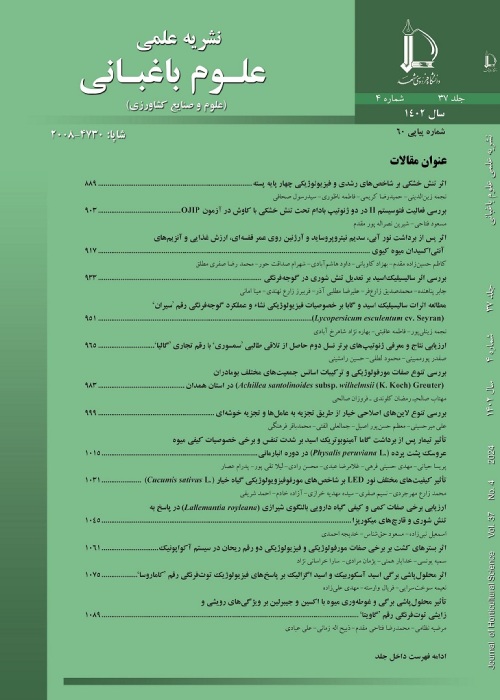Effect of Humic Acid and Organic Manure Tea on Plant Physiology and Fruit Characteristics of Pepino
Author(s):
Abstract:
Introduction
Pepino (SolanummuricatumAit.), a Solanaceous vegetable fruit has been recently introduced to Iran markets. Organic farming is currently the fastest growing agricultural sector worldwide. Although several investigations are available on chemical fertilization of pepino, the knowledge of organic fertilization ismostly lacking. Therefore, at the beginning of introducing pepino plant to Iranian farmers it worth to evaluate the impact of organic fertilization on the productivity, profitability, acceptability and sustainability of farming systemsto this plant. High chemical fertilization of pepinoincreases the vegetative growth over the generative and fruit production. The aim of this investigation was to introduce the possibility of organic production of pepino.Materials And Methods
.A two-year experiment was carried out to assess the possibility of organic production of pepino using organic fertilizers. Humistar® organic fertilizer (containing 8.6% humic acid) at 50 L/ha and sheep or cow manure teas at 1:10 and 1:5 ratios were used for production of pepino cv. Kanseola to evaluate their effects on the physiology of reproductive stage and some fruit quality characteristics. The experiments were arranged as factorial in a randomized complete block design comprised of 3 replications, each of which 10 plants. Mother plants were obtained from Mashhad Ferdowsi University and incubated in a greenhouse (mean temperature of 25 °C and 60-70% relative humidity) for 1 month to proliferate. Cuttings with 2-3 leaves at the top, 3-5 healthy buds and 20 cm length were rooted for 14 days in a rooting media, ( 1:1:2 of field soil, composted leaf and perlite), respectively. Plants were transplanted into the field in 100 × 75 cm spacing after the danger of frost was over. Treatments consisted of two levels of 1:5 and 1:10 (w:w) cow or sheep manure teas in combination with two levels of Humistar® organic fertilizer as 0 and 50L/ha levels. Control plants received no manure teas and organic fertilizer. Treatments were applied as drenching2 weeks after transplantation in a weekly manner for 10 weeks. Plant characteristics including number of days from transplanting to first flowering, flower number in truss, fruit set percentage, number of days from transplanting to the first harvestable fruit were recorded. Fruit quality indices including fruit fresh weight, fruit dry matter percentage, total soluble solids (TSS), fruit total phenolic contents and ascorbic acid content were measured at harvest time.Results And Discussions
The seasonal effect on all traits was not significant. All studied traits were affected by combination of manure teas andhumic acid except fruit total soluble solid. Cow manure tea at 1:5 v/v caused plants to fail growth in both years. The sole application of manure tea did not significantly affect the number of flowers per truss but humic acid alone or in combination with manure tea showed similar increasing trend in flower number. Application of sheep manure tea at 1:10 v/v caused the greatest total soluble solid content in fruits (up to 6.9 °Brix) as was 45% greater than control and cow manure tea treatment. The effect of humic acid on the number of days from planting to the first flower formationwas not significant. Sheep manure tea at 1:10 (v/v) level when combined with humic acid lead to the least required days preceding the first flower formation (9 days earlier flowering). The same treatment leads to the highest fruit dry matter percent (as about 8.1%) which was 10 times greater than control plants. The sole application of humic acid led to the greatest fruit set percentage as of 60% (2 fold above control). The same treatment caused 17 days earlier crop (53 days for fruit ripening versus 70 days in control plants. The greatest total phenolic content (56.1 mg gallic acid per 100 g fresh fruit over 50% greater than control plants) was obtained with sole humic acid application. This treatment leads to the greatest fruit ascorbic acid content asabout 15.62 mg/100g fw (over 57% greater than control plants).Conclusion
To obtain the preferred fruit quality for industry or fresh use, different combinations of humic acid, cow and sheep manure teas should be considered. Briefly, sole application of humic acid would affect fruitset percentage, earliness, fruit total phenolic content and vitamin C. Manure tea affect fruit total soluble solid content, while in combination with humic acid would affect flowering and fruit dry matter content.Keywords:
Language:
Persian
Published:
Journal of horticulture science, Volume:30 Issue: 1, 2016
Pages:
59 to 68
magiran.com/p1576697
دانلود و مطالعه متن این مقاله با یکی از روشهای زیر امکان پذیر است:
اشتراک شخصی
با عضویت و پرداخت آنلاین حق اشتراک یکساله به مبلغ 1,390,000ريال میتوانید 70 عنوان مطلب دانلود کنید!
اشتراک سازمانی
به کتابخانه دانشگاه یا محل کار خود پیشنهاد کنید تا اشتراک سازمانی این پایگاه را برای دسترسی نامحدود همه کاربران به متن مطالب تهیه نمایند!
توجه!
- حق عضویت دریافتی صرف حمایت از نشریات عضو و نگهداری، تکمیل و توسعه مگیران میشود.
- پرداخت حق اشتراک و دانلود مقالات اجازه بازنشر آن در سایر رسانههای چاپی و دیجیتال را به کاربر نمیدهد.
In order to view content subscription is required
Personal subscription
Subscribe magiran.com for 70 € euros via PayPal and download 70 articles during a year.
Organization subscription
Please contact us to subscribe your university or library for unlimited access!


